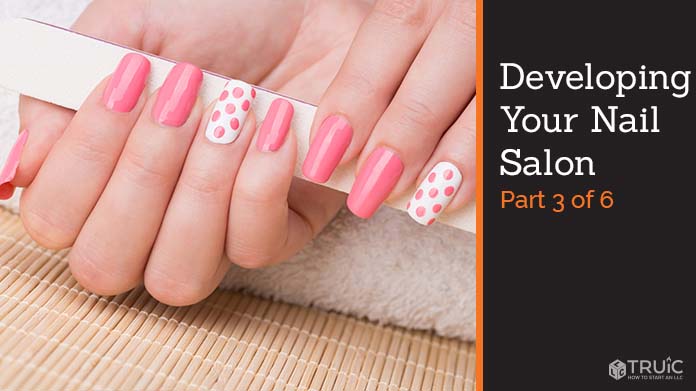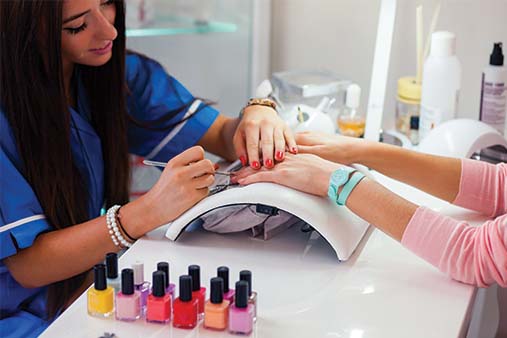Developing a Nail Salon
Now that you’ve completed your business plan and worked your way through our guides on Planning a Nail Salon and creating a Nail Salon Business Plan, it’s time to take your business from paper to the real world. Before you start filling out forms and writing checks, this guide can ensure you have everything in order.

Create Your Nail Salon’s LLC
The first step in bringing your nail salon to life is officially forming your business entity. In most cases, your best option is a limited liability company (LLC). An LLC can be formed as either a single-member or multi-member organization, giving you the flexibility to go it alone or bring on one or more business partners. An LLC is easy to start and maintain and comes with two major benefits: a simple tax structure and limited liability protection.
If you need help branding your nail salon, try using our Free Nail Salon Logo Maker. Our free tool will help you brand your nail salon with a unique logo to make your small business stand out.
Taxation
One of the key benefits of running your business as an LLC is its simple tax structure. An LLC is considered a pass-through entity for tax purposes. This means that your business revenue is “passed through” your LLC to you and any other members and claimed on your personal tax return(s). Not only does this make filing your taxes fairly straight forward, but it also avoids “double taxation,” which occurs when business owners are required to pay both corporate and personal income taxes on their company’s earnings.
Limited Liability Protection
Perhaps the most important benefit of an LLC is the personal asset protection it provides to its members. By definition, a limited liability company limits your liability to creditors to only your business assets. In practice, this means that if your company is sued for any reason, creditors cannot go after your personal assets to recoup a debt. Instead of trying to take your house or your car, for example, creditors are limited to the assets of your LLC alone. This protection is commonly referred to as the corporate veil.
Get an Employee Identification Number
Once you’ve established your LLC you’ll need to apply for an Employer Identification Number (commonly referred to as an EIN). An EIN is required before you hire employees, open your business bank account, or file taxes related to your LLC. You can get an EIN from the Internal Revenue Service for free on their website.
Open Your Bank Account
Maintaining a separate bank account and credit line for your business is essential to preserving your corporate veil. Although you will file your business taxes on your personal return, your personal asset protection is reliant on keeping your finances entirely separate.
Your business accounts should be used exclusively for business expenses and your personal accounts for personal expenses. Commingling funds will pull back your corporate veil and expose your personal assets in the event of a lawsuit.
When comparing options, consider the following criteria:
Services
The first thing to look for when choosing a bank is what services are offered both online and at branch locations.
There are several in-branch services that may be attractive to you as a business owner. Because your nail salon is likely to have a significant number of cash transactions, at a minimum you’ll need a bank that offers flexible deposit options and has one or more branches in your area.
Aside from depositing your cash earnings, the majority of your business transactions will most likely be done online. Finding a bank with robust online banking options is essential to the smooth management of your finances. Look for banks that offer online transfers, bill pay, deposits, and financial planning and management tools.
Fees
Once you’ve narrowed down your banking options by services, the next step is to understand each bank’s fee structure. Although several banks offer free business checking accounts, be sure to read the fine print before signing. Banking fees may seem small on paper but can quickly eat into your budget.
Most free accounts come with balance requirements or limited-offers that expire over time. Others offer free banking only on exclusively online accounts. Additionally, as your business grows and your banking needs to expand, some free accounts will convert to fee-based. Understanding what you will own both now and down the road can help you properly budget for this expense.
Some fees to look out for include:
- Monthly maintenance fees
- Minimum balance fees
- Transaction fees
- ATM fees
- Overdraft fees
- Check/Return deposit fees
- Savings account withdrawal fees
Transaction Limits
Another thing to be aware of when shopping for a bank is transaction limits. Many banks will only allow a certain number of transactions - deposits, withdrawals, transfers - each month before imposing a fee. The importance of this will depend on how many transactions your business needs to make each month. Limits on cash deposits are common, so be particularly attentive to how these limits may affect your business.
Optional: Get A Business Credit Card
Although not required, a business credit card can be a valuable tool during the start-up phase and beyond. Not only can a business credit card help you build a strong credit history for your business, it can also offer a number of valuable benefits and rewards.
Many small business credit cards offer targeted benefits that allow you to earn extra rewards points when you use your card on business expenses like phone and internet services or office supplies. These rewards can be anything from cash back to airline miles. Look for cards that offer perks that can be reinvested into your business. If done right, building up rewards for making your everyday business purchases can be a great way to save money.
Before opening a business credit card, be sure to do your research. Just like a bank account, credit cards come with hidden fees and limit-time offers. Although many will offer 0% APR for an introductory period, be sure you know what you will be responsible for down the road, any qualifications to the accrual or usage of rewards points, and any spending or transaction limitations.
Secure Your Investment Funds
With your business formed and your bank accounts open, it’s time to get serious about funding. At this stage, you should have a good idea of how you plan to finance your business.
Common funding options include:
Equity Investors
One of the most common ways to fund an LLC is to bring in equity investors. These investors will become members of your LLC with a stake in your business proportional to the amount they’ve contributed. An LLC’s limited liability protection can make your business an attractive investment option by lowering the overall risk to investors. However, you will still need to be prepared to share a clear business plan and thorough financial projections with any potential investors. To add new members to your LLC most states require that you file an amendment to your organizing documents.
Small Business Loan
If you cannot find sufficient investments or want to retain as much control of your business as possible, you may consider taking out a small business loan to cover some or all of your start-up expenses. Before approaching banks for a loan be sure to have your business plan, expense sheet, and financial projections in hand. Compare as many options as you can to ensure you get the best possible terms for your loan. If you’re having trouble securing funding in this way you may consider a Small Business Association backed loan.
Self-funding (Bootstrapping)
Depending on your personal financial situation, you may be in a position to contribute a good deal of money from your own savings. To maintain your corporate veil it’s critical that you fund your business the right way. To do so, you can become either an investor or a lender. To invest in your LLC, all you’ll need to do is write a personal check to your business and deposit it in your business bank account. Alternatively, you may lend money to your business by writing up a formal agreement establishing the loan amount and repayment terms.
Find a Storefront
Securing your location will be your first major expense and one of the most important decisions you make for your business. With your bank accounts and investments in order, you should waste no time beginning your search. Be sure to set aside enough time to visit and compare many locations.
At this stage you should know whether you are looking to buy or rent, purchase an existing salon or remodel an open space, and what general geographic area you hope to be in. Use the criteria you put together during the planning phase to build a list of prospective spaces and work with a commercial real estate agent to find a space that fulfills all of your needs
Once you’ve closed on your salon space you’ll want to get moving right away. Whether you plan to build your salon from the ground up or make improvements on an existing business that you purchased, you’ll have a lot of work to do before opening day. Look to your business plan to establish a clear schedule for all renovations, equipment purchases, and inspections you’ll need to complete before opening your doors.
Products/Suppliers
Properly stocking up on inventory for your salon requires a great deal of planning. A nail salon will require a combination of disposable, consumable, and reusable items along with an inventory of products for sale. To properly plan and budget you will need to know how much you need on day one, how long each item will last, how to properly clean and sanitize your reusables, and where and how to store everything.
It can be difficult to know how quickly your business will run through its initial inventory. To get a rough estimate, look at your financial projections to gauge how much business you hope to do over the first twelve months. This figure can inform your initial inventory purchases.
At the most basic level you will need to consider products in the following categories:
Nail Tools
This includes accessories such as clippers, drills, drill bits, cuticle scissors, manual and electric files, and nail bowls. You will need enough for each technician along with a surplus to replace any broken products. Most reusable tools will eventually need to be replaced, so keep close track of how long each of these items lasts.
Nail Supplies
You will need nail polish in a wide range of colors, base and top coats, and the appropriate supplies to complete the artificial nail services you will offer, such as acrylics and gel manicures. You will also need polish removers, moisturizers, cotton swabs, and a number of additional speciality products required for your service offerings. You will go through these supplies quickly, so be sure to track their usage and pay special attention to which nail colors and products are in highest demand at your salon.
Products for Sale
If you plan to sell products to your clients you’ll need to purchase an initial inventory of these items. The number and selection of products will likely change over time as you track what sells best.
Cleaning and Sanitation Supplies
In addition to the basic supplies needed to keep your salon clean and your bathroom well-stocked, you will need specific disinfecting products to keep your clients safe. Properly disinfecting your tools, supplies, and equipment is essential to prevent fungal or bacterial infections from invading your salon and infecting your clients. This will require maintaining a steady supply of both disposable items and authorized cleaning products. Each state has its own disinfecting standards for nail salons, but most require that all reusable items be washed with soap and water and then disinfected with an EPA-registered disinfection agent between each use. Any item that comes into contact with clients and cannot be disinfected must be disposed of after every use.
Next, begin researching suppliers. Because you’ll be purchasing everything from cotton swabs, sanitation wipes, and toilet paper to nail polish, exfoliating scrubs, and massage oils, you may end up contracting with more than one wholesaler. Finding companies that are easy and reliable to work with, sell quality products, and offer fair prices can be a challenge. Some of the best ways to select suppliers is to talk to other business owners and attend trade shows where you can meet face to face with suppliers across the industry.
Permits/Licensing
Before your business can operate legally there are a number of licenses and permits you will need to obtain. The specific requirements and costs will vary based on your state or county’s particular business regulations, but most states require some form of the following:
Business License
Any business operating in the United States must carry a general business license. Typically these licensing requirements will exist at the city or county level. Your state’s business services website should be able to point you toward both the regulations in your area and the proper authority to contact about obtaining your business license.
Cosmetology Establishment License
In addition to a general business license, many states require nail salons to carry a salon or cosmetology establishment license. Your state’s business management website will explain the steps needed to obtain this license.
Zoning Permit
Many cities and counties have zoning laws in place to control the number and type of businesses or other development that enters a given area. Depending on where your salon is located you may be required to obtain a zoning permit to operate your business.
Health Permit
Most nail salons will also need to undergo an inspection and receive a permit by the state Department of Health. This ensures your salon is compliant with all health code regulations designed to keep your employees and your clients safe.
Seller’s Permit
Because your salon will sell products and services to the public, you will need to obtain a seller permit or a tax and use permit. No matter what your state calls it, this permit allows you to collect, report, and pay state sales tax.
Personal Cosmetology License
Every employee performing salon services must have a current state-issued cosmetology license to perform their specific duties. Not all states require the owner of a salon to carry this license, but some do require that at least one person in a management position hold a license whether they perform services or not.
Insurance
Although your LLC will offer you personal liability protection from creditors, it cannot shield you from business losses. Without proper insurance coverage you can easily lose your business to any number of predictable or unpredictable events. Some types of commercial insurance, such as workers’ compensation insurance, are required by your state government. Others, like general liability insurance, while not necessarily required, are highly recommended for most businesses.
Although some policies may seem expensive when you’re just starting out, the cost of remaining uninsured can be far greater. Operating your business without coverage for even a few days will leave you open to uncovered and potentially devastating claims. Some of the most popular business insurance options include:
Workers’ Compensation Insurance
Every state but Texas requires that all businesses with a certain number of employees carry workers’ compensation insurance. These policies cover employees who suffer injuries or become ill while working. Workers’ compensation insurance covers immediate medical treatment, lost wages, ongoing care, and death benefits. It is a form of “no fault” insurance, meaning it will provide coverage whether or not you, the employer, are responsible for the illness or injury in question.
General Liability Insurance
Although not required by law, general liability insurance is carried by the vast majority of American businesses. This insurance policy covers some of the most common claims faced by companies across a range of industries. These include third-party bodily injury, third-party property damage, advertising liability, and copyright issues. This policy will cover you if someone slips and falls in your salon or has any of their personal property destroyed by one of your products.
Professional Liability Insurance
Unlike general liability insurance, professional liability insurance is geared toward covering perils specific to your line of business. Sometimes called “errors and omissions” insurance, this policy can be critically important to a nail salon faced with accusations that an employee made a mistake during one of their services.
Commercial Property Insurance
Commercial property insurance protects your nail salon’s physical location and everything inside it. This coverage gives you protection in the event of damage caused by natural disasters, fires, burst pipes, and other perils. In addition to your building, commercial property insurance covers your signage, furnishings, equipment, and inventory.
To keep your nail salon safe, it is recommended that you carry at least general liability insurance, commercial property insurance, and workers’ compensation insurance from day one.
You may be able to bundle some of these coverages into a single policy, known as a Business Owner’s Policy (BOP). This will not only simplify the management of your insurance policies, but could possibly save your business money. Speak with a business insurance agent to ensure your business is properly covered.
Hiring
Finally, it’s time to think about hiring employees. Hiring the right people at the right time will have a huge impact on the long term growth and success of your business, while bringing on the wrong people early on can be devastating. For this reason, it is essential that every business owner approach the hiring process with a clear plan.
Initial Employees
Hiring the best employees for your business will have a long-term effect on your company’s productivity, culture, and morale. As a service-based business, hiring the right employees is essential.
Unless you are starting a small at-home salon or a one-person mobile salon, you will need to hire at least a handful of employees ready to work from day one. At a minimum your start-up staff should include one or more technicians to perform salon services, a front desk receptionist to greet clients, answer phones, and make appointments, and someone to manage the day to day business functions of the salon. You may choose to take on one or more of these tasks yourself, but will not be able to handle all of them on your own.
Before making any final hiring offers, be sure you are ready to bring your new employees on board. This means having your payroll system set up and any benefits offered ready to go.
You also need to be sure there is a physical space ready for them to work and someone available to train them. Even if your salon is not yet open, you want to have your manicure and pedicure stations and front desk area ready to use before your employees’ first day at work. This will ensure that every employee feels welcome and has an opportunity to get comfortable with their workspace before seeing clients.
Training
Your first employees will be the face of your new business. Each interaction they have with a client will determine your rate of repeat clients and how quickly you become profitable. Word of mouth marketing will be critical in the early days of your salon, so ensuring each client has an exceptional experience is essential at this stage.
While no business wants bad reviews at any point, negative feedback in your first weeks will stand out far more than a few 1-star reviews among a sea of 5-stars down the road. As such, it is important to put together a training plan that addresses not only the basic functions of their role, but also what you expect from them as your business is getting off the ground.
Action
If you’ve made it this far, you’re in a great position to take your business to the next level. Take care of each item above and you’ll be on your way to opening day.


